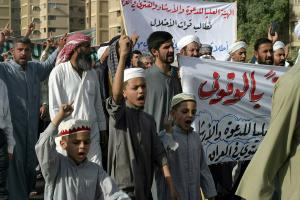Issue Date: November 21, 2003
Violence will escalate unless creative, targeted economic and diplomatic solutions are found By BEHROUZ SABA The same day a U.S. Army Chinook helicopter was downed in Iraq, killing 16 soldiers and wounding 20, National Public Radio carried an item about Lt. Gen. Moshe Ya’alon, chief of staff of the Israeli armed forces, who publicly criticized the Sharon administration’s sustained military incursions into Palestine as “contrary to our strategic interests.” The same statement, word for word, applies to the Bush administration’s military policies in Southwest Asia, as they take an increasing toll of American, Iraqi and Afghani lives. Tiny, homogenous Palestine has defied a military solution as its opposition forces have escalated from stone-throwing to suicide bombing during the two decades of the intifada. In Iraq and Afghanistan, however, U.S. forces are up against a staggering patchwork of religions, ethnicities and nationalities across a vast, treacherous terrain that has defeated, since time immemorial, scores of armies that have come to conquer. “We are taking the war to the terrorists,” Secretary of Defense Donald Rumsfeld declared proudly when inaugurating Bush’s so-called preemptive policy. In truth, however, the United States has saddled itself with administering the failed state of Afghanistan and an Iraq that has proved itself ungovernable for decades, save by the most ruthless means. American forces are mainly fighting Arab, Pashtun and Pakistani irregulars rather than terrorists with means and intentions to do this country harm on a global scale. American presence is, in fact, inviting more fighters from across the region and as far away as Europe and North Africa, making the problem even worse. Time and again, those familiar with the region have stressed its mind-boggling complexities. Iraq and Afghanistan would not exist now were it not for the long-obsolete interests of British colonialists who created them. Today, Arabs and non-Arabs, Shias and Sunnis and tribes with long histories of conflicts and allegiances see their lives further disrupted at the point of American rifles with little of the promised help forthcoming. Twenty-year-old soldiers with M-16s can do little but to shoot or get shot. It takes seasoned, knowledgeable, tough negotiators to bring under control a situation that is clearly unraveling and may evolve into a wider war in a place where the world can least afford instability. The redrawn map in the Balkans, which quelled violence in that region, and the granting of independence to the former Soviet Union’s southern territories based on ethnicity and nationality should be considered starting points for the creation of models for a more workable reconfiguration of Iraq and Afghanistan. Should America, as it now intends, reconstitute Saddam’s military and secret police in Iraq, it would simply replace the Baathist stamp with its own on organizations with deep roots in state terror. In Afghanistan, bringing “moderate” Taliban to the table, which is now being considered to establish an Islamic Republic of Afghanistan, is equally absurd. Even with American troops on the ground, fighting between two warlords is raging in northern Afghanistan. Without territorial apportioning to reflect the region’s diversity of cultures and interests, fighting there will go on indefinitely with or without American presence. The billions being earmarked to rebuild Iraq on a massive scale, with large projects that can be easily targeted and sabotaged, may be far better spent on smaller ventures based on regional needs. The trillions in future oil revenues should also help to fund enterprises throughout the area to foster a diversified economic base rather an economy that depends solely on oil. As the Grameen Bank in Bangladesh has demonstrated, a micro-loan given to an impoverished family to start a business does a great deal more good than billions tossed into dysfunctional bureaucratic sinkholes. The same combination of a negotiated settlement and targeted economic aid presents the only solution to the Palestinian impasse. These complex considerations are completely removed from the rhetoric of a U.S. president who merely dared, “Bring it on.” They have brought it on. A native of Iran, Behrouz Saba writes widely on Middle Eastern and American social, political and cultural issues. National Catholic Reporter, November 21, 2003 |
